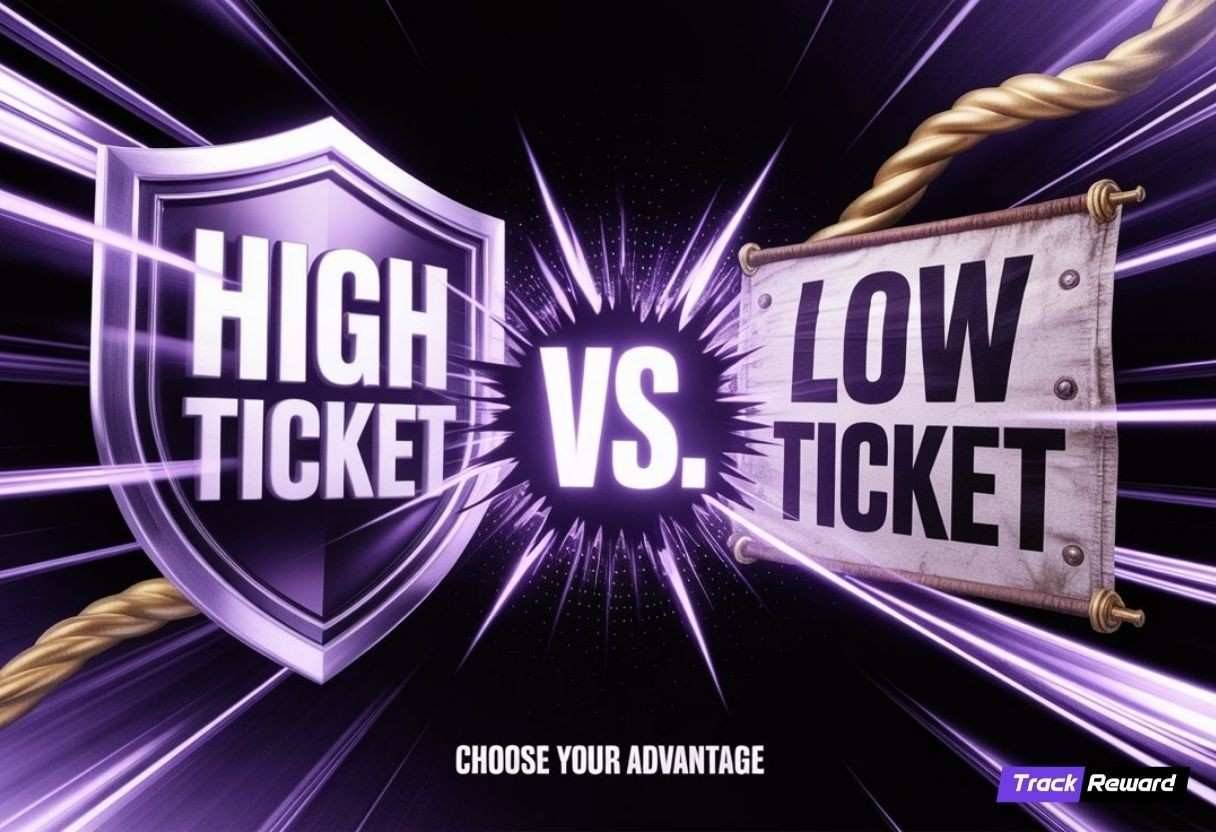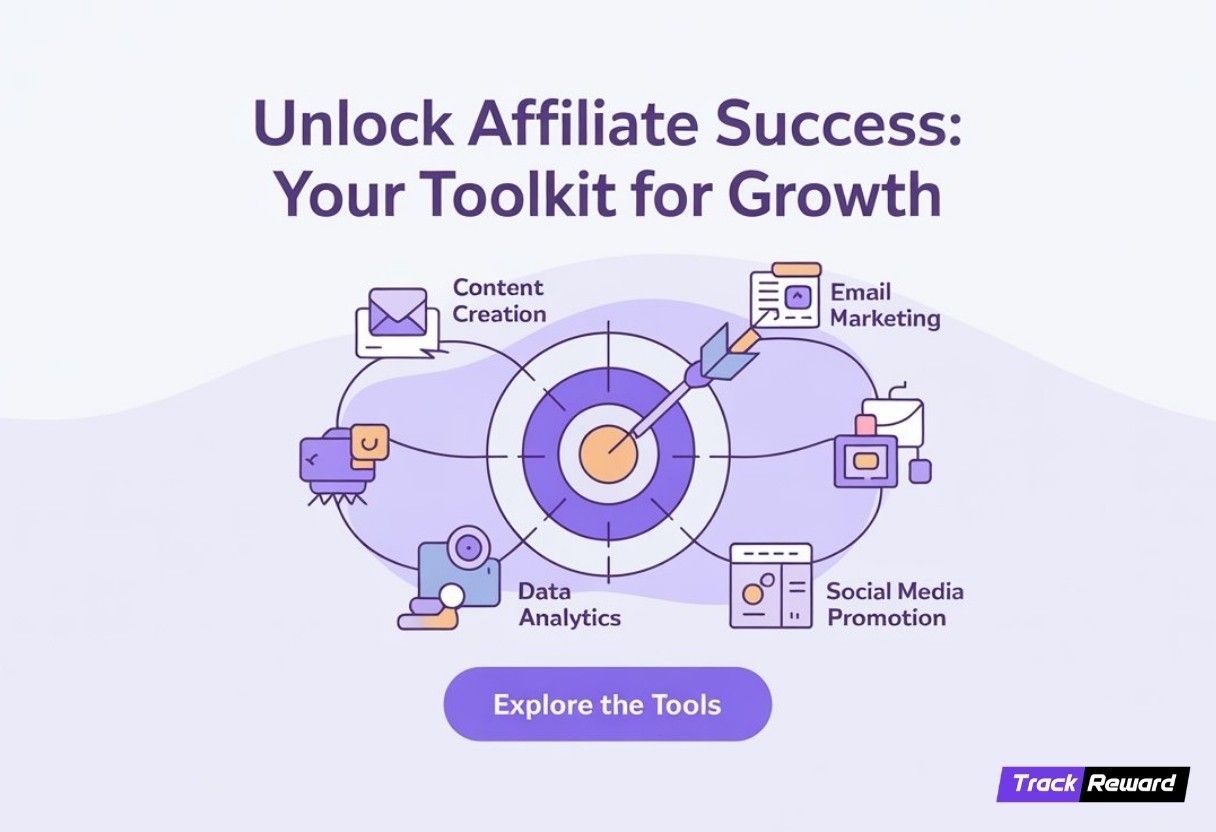The world of affiliate marketing offers diverse opportunities to earn revenue by promoting products or services. Two prominent strategies dominate the landscape: high-ticket and low-ticket affiliate marketing. Deciding which path to pursue can significantly impact your earning potential and overall business strategy. This comprehensive guide will dissect both models, compare their nuances, and demonstrate how platforms like TrackReward can help you excel, regardless of your chosen approach.
Understanding High Ticket Affiliate Marketing
High-ticket affiliate marketing involves promoting products or services that command a significant price, typically resulting in larger commissions per sale. This model focuses on quality over quantity, aiming for fewer, more impactful conversions.
What Defines "High Ticket"?
While there's no universally agreed-upon threshold, "high ticket" generally refers to products or services with a sale price of several hundred to many thousands of dollars. The commission on these sales can range from hundreds to thousands of dollars per conversion. Examples include high-end software subscriptions, luxury goods, coaching programs, real estate, or premium online courses.
Advantages of High Ticket Affiliate Marketing
The most apparent benefit of high-ticket affiliate marketing is the potential for substantial earnings per sale. A single conversion can net you more than dozens of low-value sales. This allows affiliates to achieve significant revenue with fewer transactions, reducing the need for massive traffic volumes. Additionally, high-ticket products often cater to a more niche and dedicated audience, leading to higher customer lifetime value (LTV) and potentially stronger relationships between the merchant and the customer. The focus on quality can also mean less customer support overhead for affiliates.
Challenges of High-Ticket Affiliate Marketing
Despite the allure of large commissions, high-ticket affiliate marketing comes with its own set of challenges. The sales cycle is typically longer due to the higher investment required from the customer. Trust and authority are paramount, demanding a deeper level of expertise and content creation from the affiliate. Competition can be intense for these lucrative offers, and the audience is often smaller and more discerning. Converting a high-ticket lead often requires more personalized engagement and a sophisticated understanding of the customer's needs and pain points.
Exploring Low-Ticket Affiliate Marketing
In contrast, low ticket affiliate marketing involves promoting products or services with lower price points and, consequently, smaller commissions per sale. This strategy thrives on volume, aiming for a large number of conversions.
What Characterizes "Low Ticket"?
Low ticket items typically cost under $100, and commissions might be a few dollars or a small percentage of the sale. Common examples include e-books, inexpensive software tools, small digital products, or everyday consumer goods.
Benefits of Low-Ticket Affiliate Marketing
The primary advantage of low-ticket affiliate marketing is the speed and ease of conversion. Due to the lower price, customers are often quicker to make a purchase decision. This model is excellent for generating consistent, albeit smaller, revenue streams through high-volume sales. It's generally easier to get started in low-ticket affiliate marketing as it requires less upfront investment in building deep authority or complex sales funnels. It also allows affiliates to cast a wider net and reach a broader audience.
Drawbacks of Low-Ticket Affiliate Marketing
The main drawback of low-ticket affiliate marketing is the sheer volume required to achieve significant earnings. You need to drive a massive amount of traffic and secure numerous conversions to generate substantial income. This can be highly demanding in terms of marketing efforts and may involve extensive content creation or advertising spend. Profit margins per sale are minimal, making it harder to absorb marketing costs or unexpected issues.
High Ticket vs. Low Ticket: A Direct Comparison
Let's break down the core differences between these two affiliate marketing approaches.
Commission Structures and Earning Potential
High ticket offers substantial commissions per sale, often representing a significant percentage of the product's high price. Low ticket, conversely, provides smaller commissions per sale, requiring a high volume to generate meaningful income. For example, a $1,000 product with a 20% commission yields $200, while a $20 product with a 50% commission yields $10. You'd need 20 low-ticket sales to equal one high-ticket sale in this scenario.
Audience Engagement and Sales Cycles
High ticket sales typically involve a longer sales cycle. Customers need more time, information, and reassurance before committing to a significant purchase. This often necessitates building strong relationships and providing in-depth guidance. Low ticket sales have shorter sales cycles, driven by impulse or immediate need, requiring less intensive customer engagement.
Marketing Strategies and Required Skills
Marketing high-ticket products often involves educational content, webinars, personalized outreach, and strong testimonial evidence. Affiliates need to be skilled in building trust and demonstrating expertise. Low ticket marketing focuses on broader appeal, quick wins, and volume-based strategies like social media ads, email blasts, and SEO for high-volume informational keywords.
Optimizing Your Affiliate Strategy with TrackReward
No matter if you lean towards high-ticket or low-ticket affiliate marketing, TrackReward provides a robust platform to manage and optimize your programs efficiently.
Flexible Commissions for Any Model
TrackReward allows you to set up various commission structures, including affiliate target bonuses and signup bonuses, making it adaptable for both high-value percentage-based commissions and volume-based flat-rate rewards. This flexibility ensures you can incentivize affiliates effectively, whether they are driving a few high-value sales or many smaller ones.
Real-time Insights for Strategic Decisions
Access real-time analytics and reporting to track the performance of your affiliate program. TrackReward's comprehensive reporting feature provides insights into 18 key data points, allowing you to monitor sales, commissions, leads, and visitor data. This is crucial for both models. For high ticket, it helps you understand the effectiveness of each high-touch conversion. For low ticket, it provides an overview of the overall volume performance.
Robust Fraud Prevention for High-Value Sales
For high-ticket products, where the stakes are higher, fraud prevention is critical. TrackReward's robust fraud management tools safeguard your program against fraudulent activities. This provides peace of mind when dealing with significant commission payouts.
Streamlined Payouts for High-Volume or High-Value Commissions
Whether you're processing a few large commissions or hundreds of small ones, TrackReward streamlines the payout process. You can make payments to hundreds of affiliates simultaneously, directly from the dashboard, saving valuable time and ensuring timely disbursements.
TrackReward: Value vs. Pricing - Your Ideal Affiliate Software
TrackReward offers scalable pricing plans designed to grow with your business, providing excellent value regardless of your affiliate marketing scale.
Starter Plan: Ideal for Emerging Programs
At just $29 per month, the Starter plan is perfect for businesses beginning their affiliate journey. It supports up to $5,000 in monthly revenue, 10,000 website visitors, and 200 affiliates across a maximum of 3 campaigns. This plan provides essential features for effective tracking and management at an accessible price point, making it suitable for those testing the waters with either high-ticket or low-ticket offers.
Professional Plan: Scaling Your Affiliate Success
The most popular Professional plan, at $79 per month, caters to growing businesses. It expands limits to $15,000 in monthly revenue, 25,000 website visitors, and 500 affiliates across a maximum of 5 campaigns. This plan offers enhanced capabilities for those ready to scale their high-ticket endeavors or manage a larger volume of low-ticket sales, providing a significant boost in capacity for a moderate increase in cost.
Enterprise Plan: Unlimited Growth Potential
For large-scale operations or businesses anticipating rapid expansion, the Enterprise plan at $129 per month offers unlimited monthly revenue, website visitors, affiliates, and campaigns. This top-tier plan ensures that TrackReward can handle any volume, making it the most logically suitable choice for businesses with ambitious high-ticket strategies or those managing a vast network of low-ticket affiliates. It provides peace of mind, knowing your tracking solution will never be a bottleneck to your growth.
The TrackReward Free 14-day Trial: A Risk-Free Start
Regardless of the plan you choose, TrackReward offers a free 14-day trial. This allows you to experience the full capabilities of the platform and determine its fit for your specific high-ticket or low-ticket affiliate marketing needs without any financial commitment. It's a risk-free opportunity to see how TrackReward can optimize your affiliate program and drive results.
Choosing the Right Path for Your Business
The decision between high-ticket and low-ticket affiliate marketing depends on your business goals, resources, and risk tolerance.
When to Focus on High Ticket
Choose high ticket if you have the resources and time to build deep trust and nurture leads. This is ideal for SaaS companies with complex, high-value solutions where a single conversion significantly impacts revenue. If your audience is niche and willing to invest in premium solutions, high-ticket items can be highly profitable.
When to Lean Towards Low Ticket
Opt for low ticket if you prioritize consistent, incremental revenue and aim for a broad market reach. This works well for products with mass appeal and quick conversion cycles. It's often a good starting point for new affiliate marketers to build experience and generate initial income.
Hybrid Models: The Best of Both Worlds
Many successful businesses employ a hybrid approach, combining elements of both. You might use low-ticket products as an entry point to attract a wide audience, then upsell or cross-sell them into higher-ticket offerings. This strategy allows for diversified revenue streams and leverages the strengths of both models. For example, a SaaS company might offer a free tool (low ticket) to generate leads and then convert them to a paid subscription (high ticket).
Frequently Asked Questions (FAQs)
What is the main difference between high-ticket and low-ticket affiliate marketing?
The main difference lies in the price point of the products or services being promoted and, consequently, the commission per sale. High ticket involves expensive items with large commissions, while low ticket involves affordable items with smaller commissions but higher volume potential.
Is high-ticket affiliate marketing harder than low-ticket?
High-ticket affiliate marketing often requires more effort in building trust and nurturing leads due to the higher financial commitment from customers, leading to longer sales cycles. Low ticket sales are typically quicker and easier to convert, but demand higher sales volume to achieve significant income.
Can TrackReward support both high-ticket and low-ticket affiliate programs?
Yes, TrackReward is designed to be versatile and supports both high-ticket and low-ticket affiliate programs with flexible commission structures, real-time analytics, and efficient payout options to suit various business models.
How can I choose the best affiliate marketing strategy for my business?
Consider your target audience, the nature of your product or service, your available resources for marketing and customer nurturing, and your desired earning potential. A hybrid approach often allows for diverse revenue streams.
Does TrackReward offer a free trial?
Yes, TrackReward offers a free 14-day trial for all its plans, allowing you to thoroughly test the platform's features and suitability for your affiliate marketing needs before committing financially.


